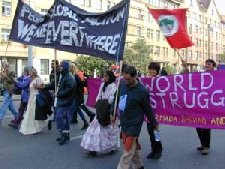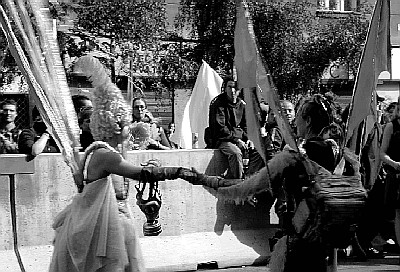 People's Global Action (PGA) is a network for spreading information and coordinating actions between grassroots movements around the world. These diverse groups share the same opposition to capitalism, and committment to direct action and civil disobediance as the most effective form of struggle. PGA grew out of the international Zapatista gatherings in 1996 and 1997, and was formed as a space for direct and un mediated contact between autonomous groups.
People's Global Action (PGA) is a network for spreading information and coordinating actions between grassroots movements around the world. These diverse groups share the same opposition to capitalism, and committment to direct action and civil disobediance as the most effective form of struggle. PGA grew out of the international Zapatista gatherings in 1996 and 1997, and was formed as a space for direct and un mediated contact between autonomous groups.
The first conference took place in 1998, when movements from all continents met in Geneva and launched a worldwide coordination of resistance against the global market economy and the World Trade Organisation (WTO). Later that year, hundreds of coordinated demonstrations, actions and street parties took place on all five continents, against the meeting of the G8 and the WTO ministerial meeting. From Seattle to Genoa, many of the groups and movements involved with PGA have been a driving force behind the global anti-capitalist mobilisations.
A second international conference took place in Bangalore, India in 1999 and the third in Cochabamba, Bolivia 2001. There have been regional conferences in Latin America, North America, Asia and Europe, and three caravans of movements: the Intercontinental caravan, the Colombian Black Communities tour and the Peoples' caravan from Cochabamba to Colombia.
PGA is not an organisation and has no members. However PGA aims to be an organised network. There are contact points for each region, who are responsible for disseminating information and convening the international and regional conferences; an informal support group that helps with fundraising; a website, numerous email lists; and a secretariat.
The basis of unity and political analysis is expressed in the constantly evolving manifesto and hallmarks. See www.agp.org for more background on PCA, its organisational principles and the manifesto in full.
Hallmarks
- A very clear rejection of capitalism, imperialism and feudalism, and all trade agreements, institutions and governments that promote destructive globalisation.
- We reject all forms and systems of domination and discrimination including, but not limited to, patriarchy, racism and religious fundamentalism of all creeds. We embrace the full dignity of all human beings.
- A confrontational attitude, since we do not think that lobbying can have a major impact in such biased and undemocratic organisations, in which transnational capital is the only real policy-maker.
- A call to direct action and civil disobedience, support for social movements' struggles, advocating forms of resistance which maximise respect for life and oppressed people's rights, as well as the construction of local alternatives to global capitalism.
- An organisational philosophy based on decentralisation and autonomy.
Hallmark #4 was changed in Cochabamba to remove the word "non-violent". Non-violence has very different meanings in India (where it means respect for life) and in the West (where it means also respect for private property). The North American movement felt that the term could be understood to not allow for a diversity of tactics, or even contribute to the criminalisation of part of the movement. The Latin American organisations said that "non-violence" seemed to imply a rejection of huge parts of the history of resistance.
Non-violence has to be understood as a guiding principle, relative to the particular political and cultural situation. Actions which are perfectly legitimate in one context can be unnecessarily violent (contributing to brutal social relations) in another.
